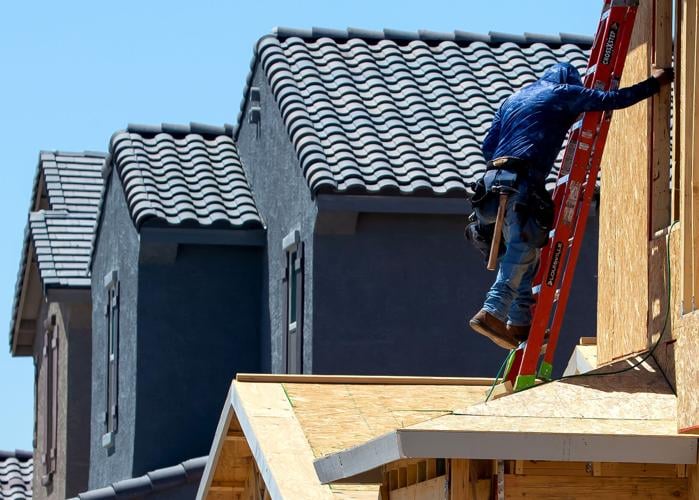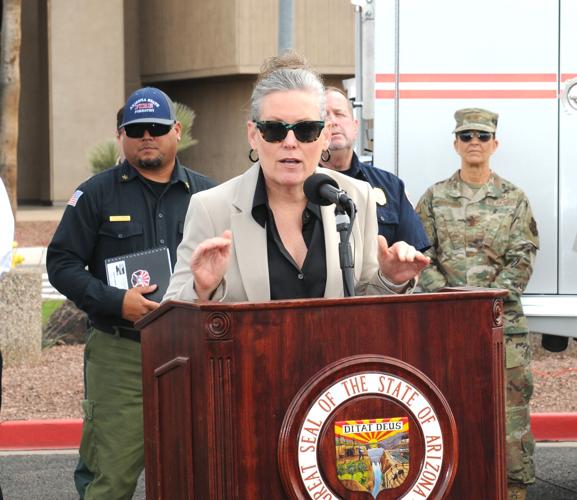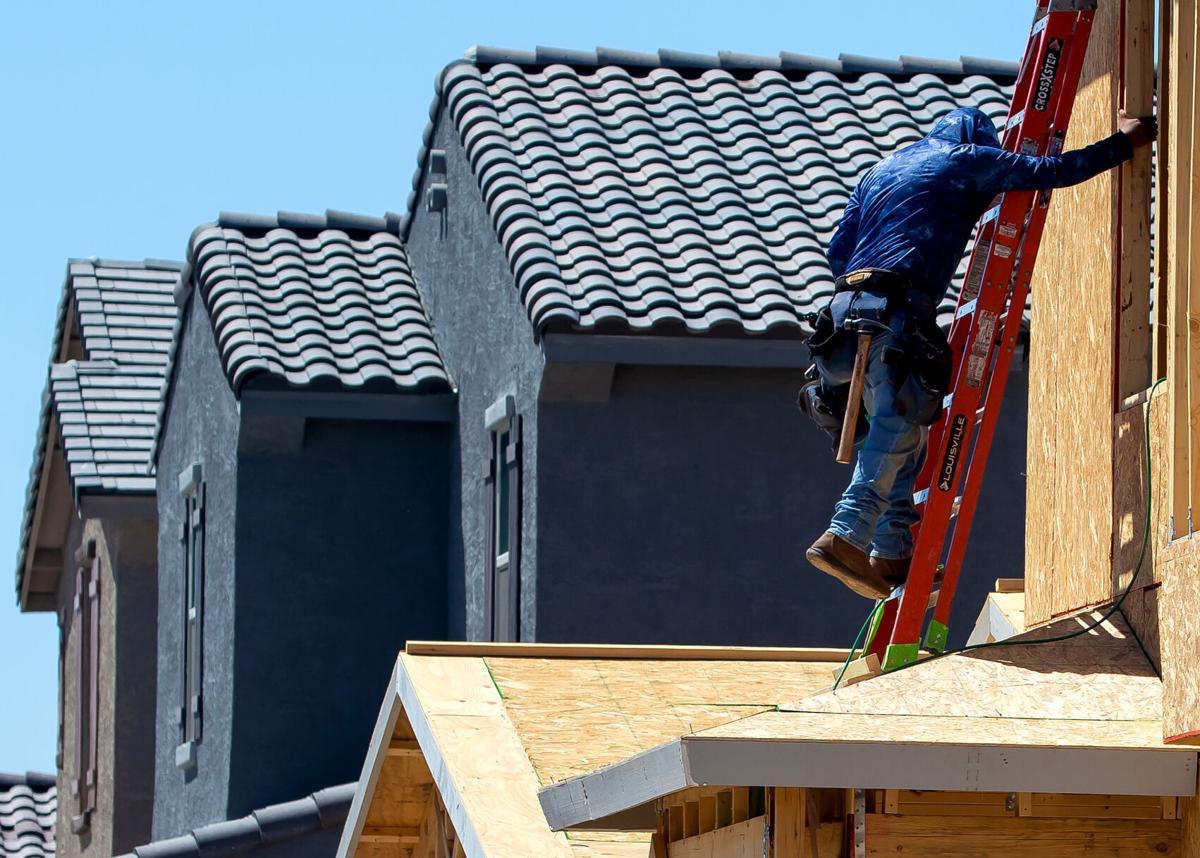PHOENIX — Gov. Katie Hobbs vetoed the “Starter Homes Act’’ Monday, saying the bipartisan bill promoted as making housing more affordable is “a step too far.’’
“This is unprecedented legislation that would put Arizonans at the center of a housing reform experiment with unclear outcomes,’’ Hobbs said in her veto of House Bill 2570. “It lacks the nuance necessary for statewide reform.’’
The legislation would have overridden various local planning and zoning regulations. It also would have allowed much smaller lot sizes in residential areas — as small as 1,500 square feet — and precluded communities from establishing minimum square footage for single-family homes.
Homes could have been as close as 10 feet from the property line in front and back and 5 feet on either side. And cities could not have imposed any design, architectural or aesthetic elements on single-family homes other than those in historic districts.
All those, the Democratic governor said, are issues that should be decided at a local level.
The veto drew a stringing reaction from Rep. Analise Ortiz, a Phoenix Democrat who said the legislation “would have created a pathway to the American dream of home ownership that too many Americans find themselves locked out of.’’ Ortiz said this is personal for her.
“People like me, my generation, are tired of being told we need to be forever renters,’’ she said. “We deserve that same shot at the American dream.’’
Hobbs insisted this isn’t the end of efforts to promote more affordable housing.
“I am supportive of ongoing efforts in the legislature to reach a more balanced solution on other reforms that are still moving through the process,’’ she said.
One of those would require cities of more than 150,000 to allow residential or mixed-use development on a portion of lands currently zoned for commercial, office, retail or parking use.
Another would require cities to permit homeowners to construct “accessory dwelling units’’ on their properties that presumably could provide housing not only for relatives but also serve as rental units.
That idea is not new, with places like Tucson and Phoenix already allowing “casitas.’’ Controversy could come over how many of these units would be allowed on any given property, however.
And the governor said she is open to discussing what she called “missing middle housing options’’ that would allow duplexes, triplexes, fourplexes and fiveplexes on land zoned for residential zoning, as well as townhomes.

Gov. Katie Hobbs answering questions Monday about her veto.
Hobbs also said she is willing to support measures that would ease the regulatory burden on developers, shortening the amount of time between a proposal and final city approval that would allow construction to start.
But the measure she vetoed is not a solution, she said.
Ortiz said those other still-pending measures are not an excuse for vetoing this bill, which was popular among half of the legislative members of the governor’s own Democratic Party.
“The Starter Homes Act was the only one that dealt exclusively with home ownership,’’ Ortiz said.
In her veto message, Hobbs specifically cited opposition from mayors and city officials across the state. She said they raised issues ranging from infrastructure and land use planning to the fact that nothing in HB 2570 guaranteed that developers would build more affordable homes.
Encroachment on military bases
She also cited concerns from the Department of Defense that the legislation would permit high-density housing near military bases.
Issues of encroachment are real. Arizona was hit in the early 1990s with the closure of Williams Air Force Base in the East Valley section of Maricopa County. There has been a threat to Luke Air Force Base west of Glendale where homes continue to pop up, though the base has not only managed to avoid being shuttered but was selected as an F-35 training site.
There have been similar concerns that construction around Davis-Monthan Air Force Base in Tucson could put the base’s future in jeopardy, although the Air Force formally chose D-M last year to host a new Special Operations Command Wing.
House Majority Leader Leo Biasiucci, the sponsor of HB 2570, pointed out that no one raised those issues during months of negotiations and committee hearings.
“Where was this in January?’’ the Lake Havasu City Republican asked. “It’s something that could have been fixed if it needed to be fixed.’’
That relates to a different frustration of many lawmakers: The absence of Hobbs while they worked with developers, city officials and others to try to figure something out.
The governor acknowledged Monday that she preferred to sit aside and let others figure out a solution.
“From Day One, what I’ve said is I want to see a negotiated solution on my desk,’’ she said. “And this bill is not that.’’
Going forward? “I think I’ve made clear what I want to see,’’ Hobbs said. “I need to see something that strikes the right balance,” where the parties “come to the best solution together.’’
Hobbs leaves negotiations to others
More to the point, Hobbs said efforts to do that don’t involve her.
“I don’t necessarily think that it needs my involvement,’’ she said. “They’re the ones most closely involved in this issue.’’
Biasiucci called that “concerning.’’
“This has to be on everybody’s radar, including hers, her staff, that people are struggling to own homes, they’re struggling to get into starter homes,’’ he said.
“I know they’re busy and I know they have a lot of things going on,’’ Biasiucci said. “But, I think at the end of the day, look, this is something that every Arizona citizen is asking for, how do we stop paying high rent?’’
He pointed out that things have gotten so bad in Sedona that the city council there approved a program to provide a safe place to park for workers in the city who are living in their cars.
“That is absolutely embarrassing that we are at that point,’’ Biasiucci said. “This should not be the Arizona we live in.’’
The Sedona issue, however, is related at least in part to the fact that about 17% of housing stock in that tourist community is being used for short-term rentals. And so far state lawmakers have refused to give cities the right to limit the amount of housing that can be rented out though operations like AirBNB.
Hobbs did get praise for her veto — from Phoenix Republican Rep. Matt Gress.
“This legislation would eviscerate the local jurisdiction’s ability to define what their communities look like,’’ he said.
Gress said cities have made progress in making housing more available.
“Over the last five years, Arizona has ranked the top nationally of the total residential completions each year according to the U.S. Census data,” he said.
He said 28 of the state’s 91 cities have adopted policies to promote urban infill, 19 have reduced setback requirements and 22 have reduced lot sizes for single-family homes. Gress also said Arizona has the third-smallest average lot size in the country.
Ortiz remained unsatisfied.
“Status quo is clearly not working,’’ she said. “And believing that things will change without policies like the Starter Homes Act is, at best, wishful thinking.’’
Hobbs, in her veto message, appeared to acknowledge at least part of what Ortiz is saying.
“Our constituents want us to take action to make housing more affordable for hard-working Arizonans, because the status quo is not acceptable,’’ the governor said.
But Ortiz said the veto means “Arizona continues to kick the can down the road.’’
Get your morning recap of today's local news and read the full stories here: tucne.ws/morning






